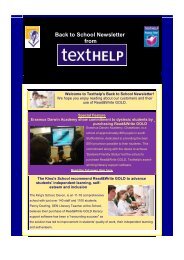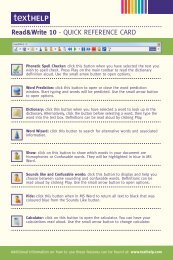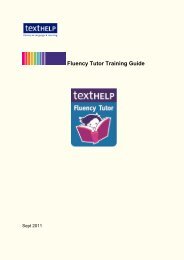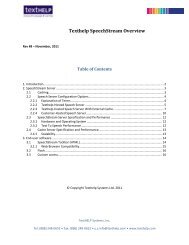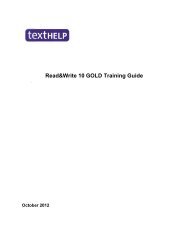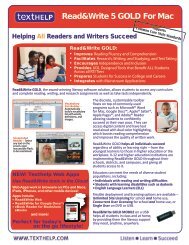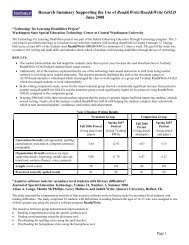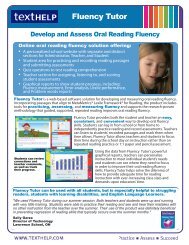01 NRDC Dyslexia 1-88 update - Texthelp
01 NRDC Dyslexia 1-88 update - Texthelp
01 NRDC Dyslexia 1-88 update - Texthelp
Create successful ePaper yourself
Turn your PDF publications into a flip-book with our unique Google optimized e-Paper software.
134<br />
Research Report<br />
This definition is similar to the Bangor <strong>Dyslexia</strong> Unit’s definition of dyslexia (which is accessible<br />
at www.dyslexia.bangor.ac.uk/what_is_dyslexia.html).<br />
Or, alternatively,<br />
The word ‘dyslexia’ has been coined from the Greek and literally means ‘difficulty with<br />
words’. The old way of describing it was ‘word blindness’—an inability to read letters<br />
and numbers in the right order—but that’s far from the whole picture.<br />
Dyslexic people can experience difficulties with organisation and short-term memory. In<br />
addition to problems with reading, spelling and writing, dyslexic people may:<br />
■<br />
■<br />
■<br />
confuse directions, muddling left and right or up and down;<br />
find it hard to remember a list, dates or times;<br />
have difficulties following a sequence—days of the week or a map of the London<br />
Underground, a-b-c, 1–2–3.<br />
From ‘<strong>Dyslexia</strong>’, a BDA leaflet published in 1999.<br />
Or, alternatively,<br />
<strong>Dyslexia</strong> is thought by many researchers to be an organic difference in the learning<br />
centre of the brain. Dyslexic people experience difficulty in processing language, both<br />
written and oral. Many may also confuse directions, sequences, verbal labels, letters<br />
and words or numbers that may look or sound similar. It tends to run in families.<br />
There is more and more evidence gathered from brain imaging techniques that dyslexic<br />
people process information differently from other people.<br />
From ‘Reading Together’, a volunteer resource pack published by the BDA in 1999.<br />
Note ‘There is no single brain center for reading, writing, or comprehension. There are<br />
only networks of highly specific mechanisms dedicated to the individual operations that<br />
comprise a complex task’ (page 133). Alfonso Caramazza, in Conversations in the<br />
Cognitive Neurosciences. Cambridge, MA: The MIT Press.<br />
British Dyslexics<br />
Our own simple definition of dyslexia is ‘intelligent, bright or even gifted individuals, that<br />
for no obvious reason, struggle to learn through the medium of written or spoken<br />
language’.<br />
Accessed at www.dyslexia.uk.com on 4 October 2002.<br />
<strong>Dyslexia</strong> Institute<br />
<strong>Dyslexia</strong> causes difficulties in learning to read, write and spell. Short-term memory,<br />
mathematics, concentration, personal organisation and sequencing may also be<br />
affected.




